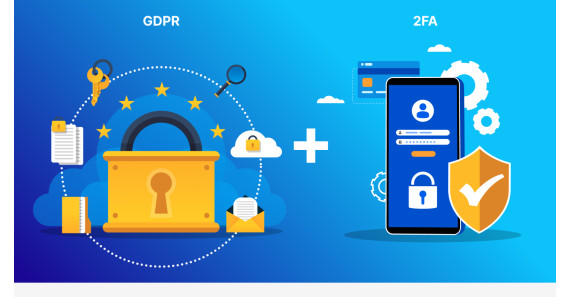
GDPR compliance for e-commerce: protecting customer data with 2FA
11/02/2025 | Тимохін Ілля
Introduction to GDPR and Its Importance
What is GDPR and Why is it Important for E-commerce Business?
The General Data Protection Regulation (GDPR) is a comprehensive data protection law that came into effect in the European Union in May 2018. It establishes strict rules for the collection and processing of personal information. For e-commerce businesses, understanding GDPR compliance is critically important, even if they are not located in Europe. Any company that processes personal data of EU citizens must adhere to these regulations, highlighting the global impact of GDPR.
Failure to comply with GDPR requirements can lead to serious consequences, including hefty fines that can reach up to 20 million euros or 4% of annual global turnover, whichever is higher. In addition to financial penalties, non-compliance can result in reputational damage, decreased customer trust, and reduced sales. Therefore, ensuring GDPR compliance is not only a legal obligation but also a fundamental aspect of a successful e-commerce business.
Key GDPR Requirements for E-commerce
To achieve GDPR compliance, e-commerce businesses must adhere to several key requirements:
- Data Minimization
Businesses should only collect data that is necessary for their operations. This means avoiding excessive data collection and focusing on what is important for fulfilling customer orders and improving services. - Consent
Explicit consent from customers must be obtained before collecting their data. This includes informing customers about how their data will be used and ensuring they understand their rights regarding personal information. - Data Security
Implementing robust security measures is critically important for protecting customer data. This includes using encryption, securing servers, and regularly updating software to protect against vulnerabilities. - Data Subject Rights
Businesses must allow customers to access their data, correct it, or delete it upon request. This enhances customer trust in the e-commerce business and aligns with GDPR principles. - Data Breach Notification
Procedures must be established for reporting data breaches. According to GDPR, businesses must notify affected individuals and relevant authorities within 72 hours of discovering a breach.
How 2FA Enhances GDPR Compliance
Two-factor authentication (2FA) adds an additional layer of security to user accounts, making unauthorized access significantly more difficult. By requiring users to provide two forms of identification before accessing their accounts, 2FA effectively reduces the risk of data breaches.
Implementing 2FA demonstrates a serious commitment to data protection, reassuring customers that their personal information is secure. This proactive approach not only helps meet GDPR requirements but also enhances overall customer trust and loyalty.
2FA Solutions for Popular E-commerce Platforms
Several e-commerce platforms support 2FA through plugins, making it easier for store owners to enhance security. Here are some of them:
CS-Cart
For CS-Cart users, our 2FA plugin provides seamless integration, allowing store owners to quickly enable two-factor authentication. Key features include ease of setup, support for various authentication methods (such as SMS and email), and customizable options. Implementing this plugin can significantly enhance the security of your store.
OpenCart
The 2FA plugin for OpenCart offers a user-friendly interface for enabling two-factor authentication. It supports multiple verification methods and provides detailed documentation to assist store owners during installation. This plugin is essential for enhancing the security of your OpenCart store.
Prestashop
Our 2FA plugin for Prestashop is designed to protect your customers' accounts with robust security measures. It allows easy system configuration and supports various authentication options, ensuring your store complies with GDPR requirements and protects customer data.
For each platform, we encourage readers to explore our marketplace for these 2FA plugins and enhance the security of their e-commerce operations.
Additional Tools and Technologies for GDPR Compliance
In addition to 2FA, there are several other tools that can help e-commerce businesses achieve GDPR compliance:
Data Encryption Tools: Encrypting sensitive data ensures that even in the event of a breach, the data remains inaccessible to unauthorized users.
Privacy Policy Generators: These tools help create comprehensive privacy policies that inform customers about how their data is used and protected.
Cookie Consent Management Platforms: These platforms help manage user consent for cookies and tracking technologies, ensuring compliance with GDPR regulations.
Conclusion
The Importance of GDPR Compliance
In conclusion, GDPR compliance is essential for e-commerce businesses to protect customer data and maintain trust. Implementing 2FA, along with other security measures, plays a crucial role in safeguarding personal information.
Summary of Key Findings
Adopting a comprehensive approach to data protection not only helps meet legal requirements but also enhances customer loyalty and business reputation. By utilizing tools such as 2FA plugins and other compliance solutions, e-commerce stores can significantly reduce the risk of data breaches and ensure safe shopping for their customers.
Call to Action
We encourage e-commerce store owners to explore our 2FA plugins available at ShopPinta.pro. Implementing these solutions will not only improve your compliance efforts but also provide your customers with peace of mind knowing their data is protected. Start taking the necessary steps to comply with GDPR today!